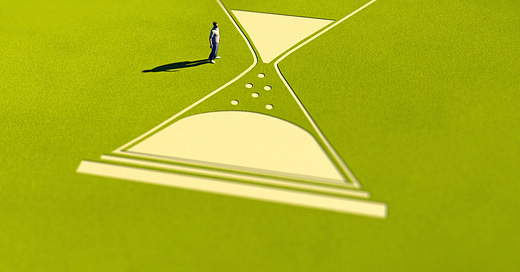Have you ever met someone who has actually achieved work-life balance? I haven’t. As Oliver Burkeman wrote in the best-selling book Four Thousand Weeks: Time Management for Mortals:
“Nobody in the history of humanity has ever achieved ‘work-life balance,’ whatever that might be and you certainly won’t get there by copying the ‘six things successful people do before 7 a.m.’”
Rather than striving for optimal time management, he advises us to make peace with the reality that there will never be enough time to do all the things we would like to do. Put simply, he argues, it’s time (pun intended) to give up the fight against time because it’s a lost cause:
“No finite human being has ever won a fight against time. We just get the limited time we get, and the limited control over it that we get. And if you spend your life fighting the truth of this situation, all that happens is that you feel more rushed and overwhelmed and impatient – until one day time decisively wins the fight, as it was always destined to do. (In other words: you die.)”
In a world filled with productivity porn, Burkeman’s perspective is refreshing. Instead of trying in vain to cram more tasks into each day and get more done, perhaps making better use of the limited time that we have is a better strategy.
Here are 7 ways to feel less frazzled:
Be a Reductionist
Whenever we encounter a problem, we almost always tend to add something. This is known as subtraction neglect. We add meetings to address issues at work, we add homework to improve academic performance, we add apps to boost efficiency, we add products to enhance skin, but rarely consider how the alternative could be transformative. What can you do less of?
Be Wherever Your Feet Are
I heard this excellent advice a few months ago. It’s a wonderful reminder to give your full attention to the moment you are in and to the person you are with.
Be Still
Press pause regularly. Rather than packing more work into a given day, take some time to reflect on the lessons of the day.
Be Helpful
A counterintuitive way to feel less pressed for time is to give it away. Volunteering and doing things for others, rather than focusing on ourselves, expands our sense of time and meaning.
Be Selective
Say no to things that don’t align with your values. Guilt and obligation are not reasons to give your time away.
Be Honest
Many people say they wish they could spend more time with their family but end up on their phones whenever they are with them. Quality face time with loved ones is a vital contributor to wellbeing. Nobody on their deathbed ever said, “I wish I had spent more time on social media.”
Be a Sleep Enthusiast
Lack of sleep is a vampire of vitality. Mental and physical energy are a fundamental currency of wellbeing. Quality time is enhanced by quality sleep.
Bottom Line
Let go of striving for that elusive ideal of work-life balance and spend your precious time doing things that matter. Sometimes that will throw you off balance and that’s okay. As Alain de Botton observed, “Everything worth fighting for unbalances your life.”






Absolutely! The unhelpful promise of “work-life balance” is that if we spent a bit more time doing one or the other we’d experience some “ahhh” of life feeling just right.
But balancing is a constant readjustment, not something ever achieved. And our friends, families, passions, and careers deserve everything we can give to them. And we can’t ignore the need to give to ourselves. So there’s never the “ahhh” of knowing that you’re spending just the right amount of time on each thing.
A better intention is to be the kind of person who, whenever and wherever you show up, is the best version of yourself you can muster in that moment. And learning how to make “the best version of yourself” keep getting better. More heart, more focus, more love, more dependable, more creative, etc. That’s enough of a challenge for a lifetime.
You are such a treasure of common sense solutions and positivity that is